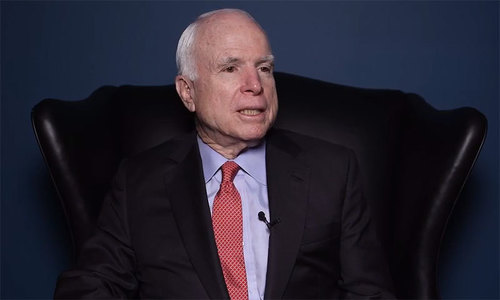YOU know that Americans are going through an extraordinary political moment when The Post reports that “military leaders are rapidly consolidating power throughout the executive branch” — that they’re “publicly contradicting” the president and “balking” at carrying out his policies — and civilian politicians react with undisguised relief.
They are grateful that, while President Donald Trump transgresses and blunders, the generals in powerful jobs — national security adviser H.R. McMaster, along with Chief of Staff John Kelly and Defence Secretary Jim Mattis — provide “a steadying hand on the rudder”, as Senator Richard Blumenthal put it.
Non-involvement in domestic politics and submission to civilian control are hallmarks of a professional military under constitutional democracy. The United States has by and large practiced those principles while also preaching them, albeit inconsistently, to other countries.
Yet while the growing influence of military officers in the government, to the point of unsubtle pushback against the commander-in-chief, raises “totally legitimate” concerns, Senator Brian Schatz, told The Post, those issues “should be addressed at a later time. In the meantime, we should be reassured that there are competent professionals who want to make smart choices.”
Like Schatz, I would rather be governed by McMaster, Kelly and Mattis than by Trump. Like him, I think they took increasingly thankless jobs in the Trump administration not for self-aggrandizement but rather out of concern for the national interest.
Long-run consequences
Unlike Schatz, however, I don’t think it’s too soon to fret about long-run consequences — for civilian institutions and military ones — of looking to an unelected officer corps as guarantors of political stability and upholders of national values.
This kind of thinking created problems in Latin America in the not-so-distant past; it belongs on the list of things we dare not “normalise” in the United States, even with good intentions.
It was indeed admirable of the military service chiefs, after Charlottesville, to denounce hate and racism in the emphatic terms that eluded their commander-in-chief. That they felt obligated and authorised to do so was nevertheless a sign that our constitutional system is badly out of balance.
To be sure, this awkward moment in civil-military relations has been a long time coming. You don’t have to embrace “deep state” conspiracy theories to recognise that the rise of a huge permanent military in the years after World War II was unprecedented, or that it strains constitutional norms and structures. Many officers emerged from that establishment to serve in senior policy roles in the White House or the cabinet, prior to the current group.
Unparalleled support
What is new, perhaps, is the fact that the military enjoys unparalleled support across the political spectrum (72 per cent expressed high confidence in the latest Gallup poll) while civilian institutions, from Congress to the media, whose constitutional role it is to check and balance the president, lack perceived legitimacy.
No wonder that many people are starting to say, or at least think, that only the military, or figures connected to it, can keep this country together.
By no means am I predicting a military coup in the United States or accusing anyone of advocating one. I am merely calling attention to how much power we already have conceded, expressly and by implication, to the officer corps and how much more we may depend on them before the Trump presidency is over. This is evidence of deep political decay, which started long before Trump’s election.
Waiving rule for Mattis
The key figure in American politics now may be Mattis, who praised the service chiefs for speaking out on Charlottesville, regularly represents the United States in foreign capitals and has prevailed in a bitter internal administration struggle over what to do in Afghanistan.
The Senate confirmed the retired four-star Marine general, by all accounts a man of experience, wisdom and integrity, by a vote of 98 to 1, even though he had been out of uniform for only four years instead of the statutorily required seven.
Congress waived that rule, enacted to protect civilian control of the postwar military establishment, for what it saw as the greater good of keeping the Pentagon under steady day-to-day management, given the president’s obvious defects.
If anyone in this polarised country still can claim to epitomise national consensus, it may be the man known as “Mad Dog”. What would be the political consequences if the president were to fire him, just as he fired FBI Director James B. Comey?
And what sort of crisis would ensue if Trump said or did something so outrageous that even the patient Mattis must resign on principle?
In a healthy democracy, political stability does not hinge on an indispensable general. In Donald Trump’s America, it might.
—By arrangement with The Washington Post
Published in Dawn, August 25th, 2017














































